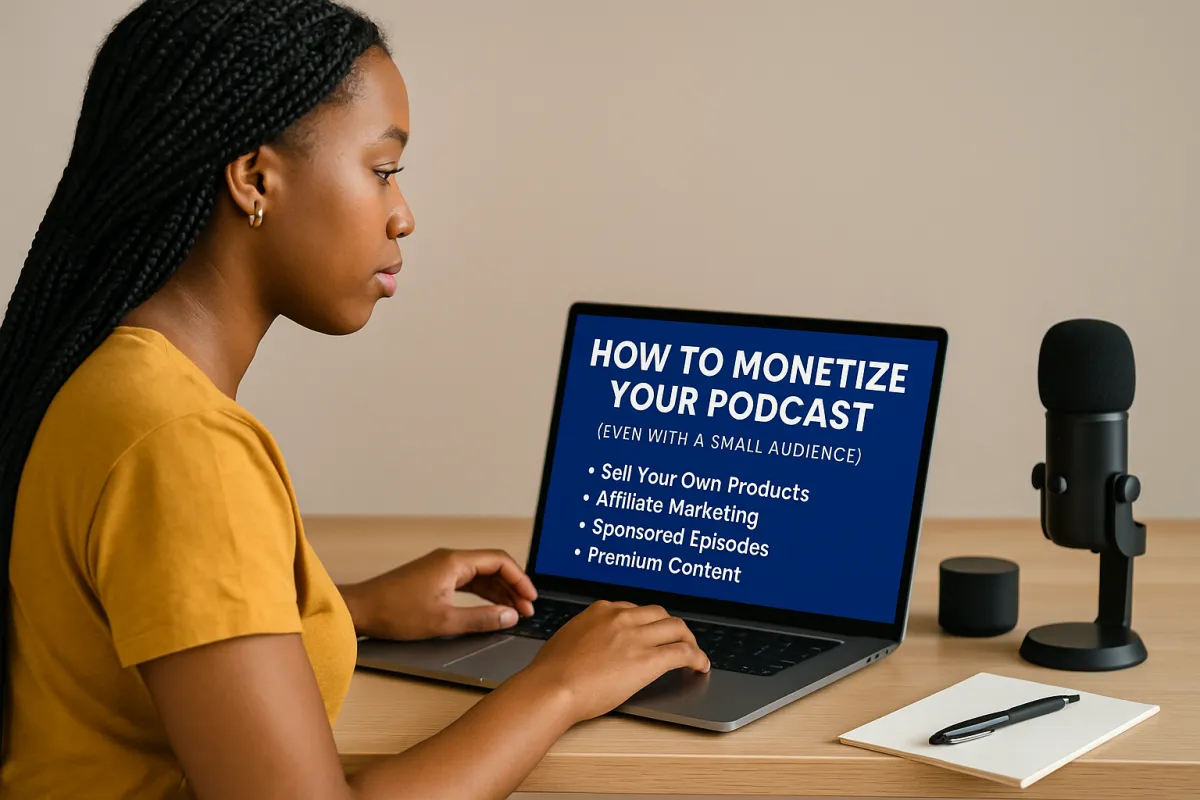
How to Monetize Your Podcast (Even With a Small Audience)
So, your podcast is up and running. You’ve been consistent. You’re getting great feedback. But here comes the real question:
“Can I actually make money from this?”
Short answer: Yes.
Long answer: You don’t need 10,000 downloads per episode to start monetizing. In fact, many small and mid-sized podcasters are generating real revenue through creative, relationship-based monetization strategies — no sponsors required.
In this guide, we’ll walk you through how to monetize your podcast even if you’re just starting out or still growing. Let’s break down what’s possible and what works.
First, Shift Your Mindset
Before we dive into tactics, let’s address a common myth:
“I need a big audience before I can make money.”
That’s simply not true. What you actually need is:
A clearly defined niche
A valuable message or offer
A connection with your listeners
A strategy that matches your strengths
If you have 100 people tuning in regularly, imagine standing in front of 100 people every week. That’s impact. That’s potential. Now let’s talk monetization.
1. Sell Your Own Products or Services
This is the most powerful and direct way to monetize — especially for coaches, service providers, consultants, and creators.
You can use your podcast to:
Sell coaching or consulting services
Promote online courses, workshops, or ebooks
Drive traffic to your Etsy store or Shopify page
Offer digital downloads (templates, PDFs, guides)
Why it works:
People buy from those they trust. If your listeners hear your voice weekly, you’ve already built the trust most businesses pay thousands to earn.
Example:
A wellness coach with 250 loyal listeners offers a $97 group challenge. 10 sign up = $970 from a single mention.
How to Start:
Dedicate one CTA (call-to-action) per episode
Create an offer that directly solves a listener’s pain point
Use your episode topics to build authority around your offer
2. Offer Sponsorships (Even Local or Micro)
You don’t need to wait until you hit 10K downloads to work with sponsors.
How to Start:
Focus on niche sponsors (local businesses, products relevant to your audience)
Create a simple sponsorship deck with:
Show stats (downloads, audience type)
Pricing (start small — $50–$150 per episode is fair for micro-shows)
Placement options (pre-roll, mid-roll, post-roll)
Example:
A podcast for freelancers gets a sponsorship from a time-tracking app. The host earns $100/episode, promoting a product they already use.
🎁 Bonus: Offer bundled rates (e.g., 4 episodes for $350) to incentivize longer-term deals.
3. Use Affiliate Marketing
Affiliate marketing means you promote a product and earn a commission when someone buys through your link. This is one of the easiest ways to monetize — especially if you’re already talking about tools, books, or software.
Where to Find Affiliate Programs:
Amazon Associates (for books, gear, tech)
ShareASale, Impact, CJ Affiliate (for niche tools and brands)
Creator platforms like ConvertKit, Riverside.fm, or Buzzsprout
How to Promote:
Mention the product in the episode
Include the affiliate link in your show notes
Create a “Resources” page on your podcast site
💡 Tip: Only promote what you use or truly believe in — your audience will know if you’re not being authentic.
4. Launch a Paid Membership or Patreon
If you’ve built a loyal core audience, offer them an exclusive experience.
You could offer:
Bonus episodes
Ad-free listening
Behind-the-scenes content
Early access to interviews
Private community or Discord group
Tools to Use:
Patreon
Supercast
Supporting Cast
Example:
A true crime podcaster with 200 die-hard fans offers bonus cases for $5/month. Even if 40 sign up, that’s $200/month in recurring revenue.
5. Use Your Podcast as a Lead Magnet
Even if you’re not monetizing directly on your podcast, you can use it to build a sales funnel that leads to income.
Ways to do it:
Promote a free resource (lead magnet)
Direct people to book a call or strategy session
Link to a webinar or live training
Your podcast builds credibility. The rest of your system turns that credibility into conversions.
This method works best if you’re a:
Coach
Consultant
Online service provider
Course creator
Agency owner
6. Repurpose Episodes Into Paid Content
Your episodes don’t have to stop at the RSS feed. Turn your best content into:
eBooks or workbooks
Mini-courses
Paid workshops
Event content
Paid newsletters
💡 Tip: Start by identifying your most downloaded or engaged-with episodes, then turn that topic into a deeper, structured offer.
7. Offer Paid Guest Opportunities or Podcast Audits
This isn’t for everyone, but some niche shows (especially business or B2B-focused podcasts) offer:
Sponsored interviews (paid guest slots with full disclosure)
Podcast audits (offering feedback on others’ shows)
Intro packages (creating intros, ad spots, or trailers for others)
At Podcast HQ, we’ve seen creators partner with newer podcasters by helping them launch — and getting paid for it.
Bonus: Stack Multiple Monetization Streams
The most sustainable shows use more than one monetization method.
Example stack:
Affiliate links in every episode
Coaching offer at the end
A $9/month Patreon for bonus content
Monthly sponsor paying $150/episode
You’re not relying on just one source — and that’s where long-term income is built.
Final Thoughts
You don’t need to be a celebrity, influencer, or top 100 podcaster to make money. You just need strategy, value, and the willingness to try.
Here’s a recap of how to monetize even with a small audience:
Sell your own products or services
Offer micro-sponsorships
Use affiliate marketing
Launch a paid membership or Patreon
Use your podcast as a lead generator
Repurpose content into paid products
Offer podcast services to others
Start with ONE. Test it. Tweak it. Then scale it.
And remember — whether you’re recording from home or from a professional studio like Podcast HQ, your voice has value. Your ideas are worth something. And your podcast can absolutely become a profitable part of your business.
Need help creating your first monetization strategy or pricing your podcast packages? Schedule a session with Podcast HQ — we’re here to help you build AND grow.